Fissure in Ano Treatment in Ghaziabad & Delhi NCR: Find Painless Relief
Advanced Laser Surgery & Expert Care for Anal Pain and Bleeding
Get Relief NowExperiencing sharp, tearing pain during or after bowel movements, often accompanied by bleeding, can be distressing and significantly impact your daily life. If you're searching for "fissure in ano treatment Ghaziabad" or "anal pain relief Delhi," you're likely dealing with an anal fissure. This common condition, though often mistaken for piles, requires specific and effective treatment.
This comprehensive guide will explain what an anal fissure is, its common causes, the uncomfortable symptoms, and the serious complications of delaying treatment. Most importantly, we'll delve into the latest, most advanced, and **painless fissure treatment** options available in Ghaziabad and Delhi NCR, including **laser fissure surgery (Laser LIS)**. Our aim is to provide you with accurate information and encourage you to seek timely medical attention for lasting relief and improved well-being.
What is an Anal Fissure (Fissure in Ano)?
An anal fissure is a small tear or cut in the thin, moist tissue (mucosa) that lines the anus. This tear typically extends from the anal opening and can be quite painful because the anal canal is rich in nerve endings.
Acute vs. Chronic Fissures:
- Acute Fissure: A recent tear, usually superficial, that often heals within a few weeks with conservative treatment.
- Chronic Fissure: A fissure that has been present for more than 6-8 weeks, often deeper, and may involve the underlying internal anal sphincter muscle, making it harder to heal without intervention. Chronic fissures may also develop a "sentinel pile" (a small skin tag) at their outer edge.
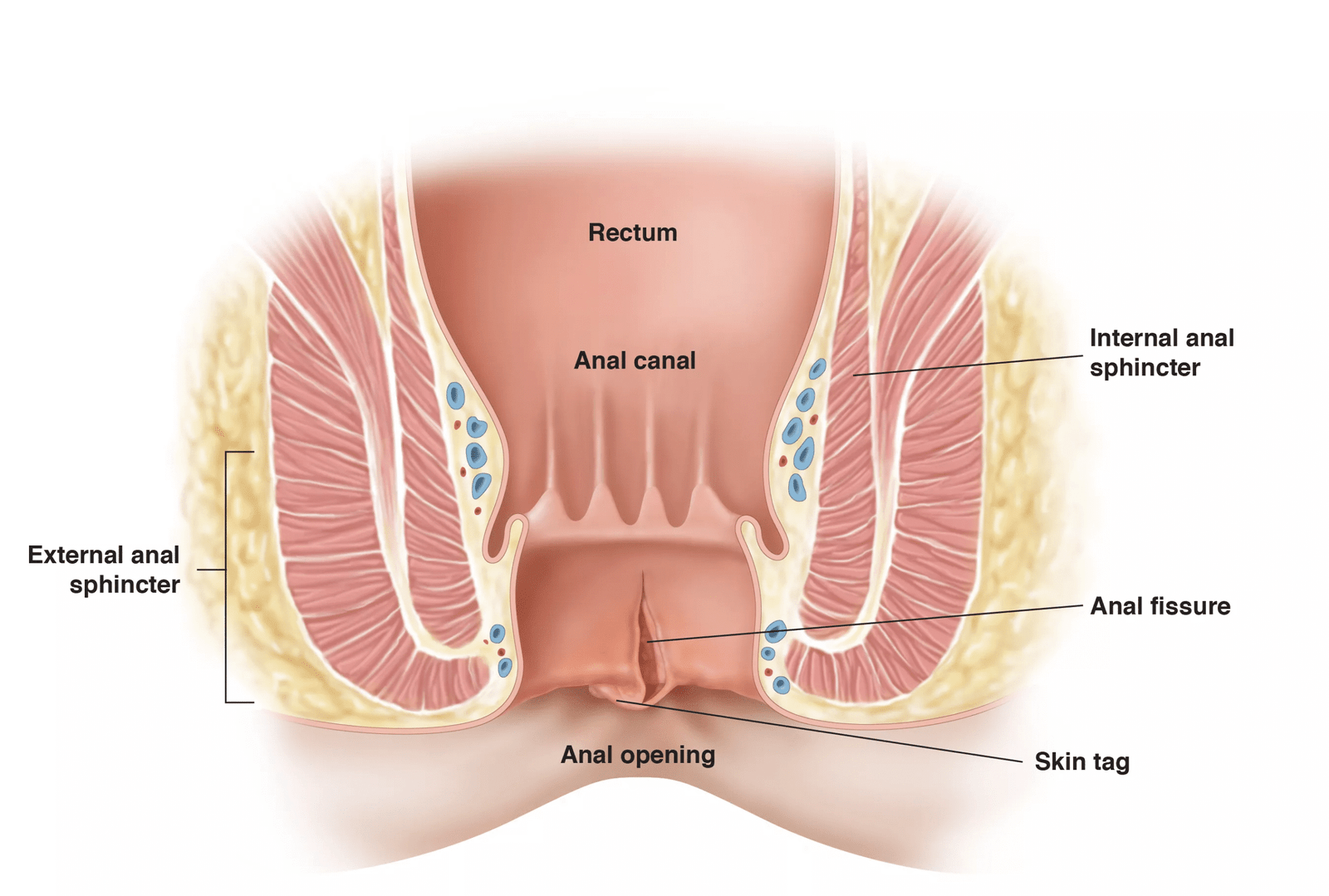
Understanding the tear: What an anal fissure looks like.
Common Causes & Risk Factors for Anal Fissures
Anal fissures are primarily caused by trauma to the anal canal, often due to:
- Passing Hard or Large Stools: This is the most common cause, as it can overstretch and tear the anal lining.
- Chronic Constipation or Diarrhea: Both can lead to straining or frequent irritation, increasing the risk.
- Prolonged Straining During Bowel Movements: This puts excessive pressure on the anal canal.
- Childbirth: Trauma to the perineum during delivery can sometimes lead to fissures.
- Inflammatory Bowel Diseases (IBD): Conditions like Crohn's disease can cause inflammation and ulceration in the anal region, making fissures more likely.
- Decreased Blood Flow to the Anus: This can impair healing and contribute to chronic fissures.
Symptoms of Anal Fissure & When to Seek Expert Help
Recognizing the symptoms of an anal fissure is crucial for timely intervention. The most prominent and often debilitating symptom is:
- Severe Pain During & After Bowel Movements: This pain is often described as sharp, tearing, or burning, and can last from several minutes to several hours after defecation.
- Bright Red Blood: Visible on toilet paper after wiping, or sometimes in the toilet bowl.
- Itching or Irritation: Around the anal area.
- Visible Crack or Tear: You might be able to see a small cut in the skin around the anus.
- Small Lump or Skin Tag: Often called a 'sentinel pile' or 'sentinel tag,' found near the fissure, especially in chronic cases.
If you experience any of these symptoms, particularly persistent severe anal pain or bleeding, it is crucial to consult a specialist. Do not delay, as early diagnosis and treatment can prevent the fissure from becoming chronic and lead to a quicker, more comfortable recovery.
The Dangers of Delaying Fissure Treatment: Complications You Must Avoid
Leaving an anal fissure untreated, especially if it becomes chronic, can lead to significant discomfort and a range of complications that severely impact your quality of life:
- Chronic Pain: The persistent pain can become debilitating, affecting daily activities, work, and sleep.
- Anal Sphincter Spasm: The pain often causes the internal anal sphincter muscle to go into spasm, which further restricts blood flow to the fissure, preventing healing and creating a vicious cycle of pain and non-healing.
- Sentinel Pile Formation: A small, benign skin tag can develop at the outer edge of a chronic fissure due to chronic inflammation.
- Infection: While less common, the open wound can become infected, leading to an abscess or fistula in rare cases.
- Impact on Quality of Life: The fear of pain during bowel movements can lead to avoidance, exacerbating constipation and further complicating the condition.
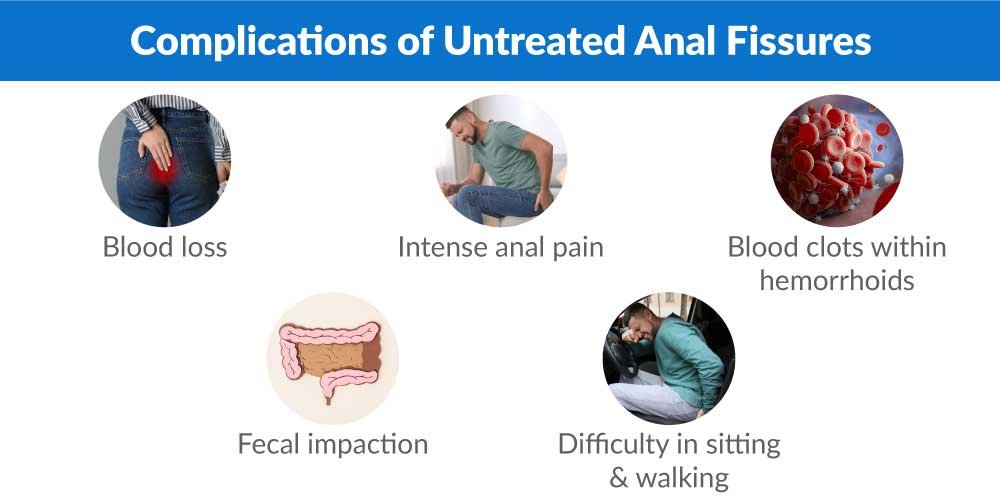
Don't let an anal fissure lead to severe complications.
Treatment Options for Anal Fissure: Medical and Surgical Approaches
Treatment for anal fissures depends on whether the fissure is acute or chronic, and its severity. Options range from conservative management to advanced surgical procedures.
Conservative (Non-Surgical) Treatments:
For acute fissures, or as a first line of treatment, conservative methods are often effective:
- High-Fiber Diet & Hydration: To soften stools and prevent straining.
- Stool Softeners: Medications to make bowel movements easier.
- Sitz Baths: Soaking the anal area in warm water several times a day can help relax the anal sphincter and promote healing.
- Topical Medications: Ointments containing nitroglycerin or calcium channel blockers can help relax the anal sphincter and increase blood flow to the fissure, aiding healing.
Advanced & Painless Fissure Treatment Options in Ghaziabad & Delhi NCR
When conservative treatments fail, or for chronic fissures, modern surgical and minimally invasive options offer highly effective and virtually painless relief. Shri Tirupati Hospital specializes in these cutting-edge procedures.
1. Laser Lateral Internal Sphincterotomy (Laser LIS)
Laser LIS is a revolutionary, minimally invasive treatment for chronic anal fissures. It offers a precise and virtually painless alternative to traditional surgery.
- How it Works: A very thin laser fiber is used to make a precise, controlled cut in a small portion of the internal anal sphincter muscle. This relaxes the muscle, reduces spasm, and improves blood flow to the fissure, allowing it to heal.
- Key Benefits of Laser LIS:
- Virtually painless procedure
- No external cuts or stitches
- Minimal bleeding
- Quick recovery and discharge (often same-day)
- Faster return to daily activities and work
- Lower risk of complications like infection or incontinence compared to traditional open surgery
- High success rate in healing chronic fissures
2. Traditional Lateral Internal Sphincterotomy (LIS)
While laser LIS is preferred, traditional LIS remains a highly effective surgical option for chronic fissures that haven't responded to other treatments.
- How it Works: A surgeon makes a small incision to cut a portion of the internal anal sphincter muscle, relieving spasm and promoting healing.
- Key Benefits:
- High success rate
- Immediate pain relief for many patients
Swift Recovery & Post-Treatment Care for Anal Fissures
Modern fissure treatments prioritize patient comfort and rapid recovery, allowing you to return to your normal life quickly.
What to Expect During Recovery:
- Minimal Pain: Especially with laser LIS, post-procedure pain is significantly reduced and manageable with mild pain relievers.
- Quick Return to Activity: Most patients can resume light daily activities within 24-48 hours after laser or Botox procedures.
- Outpatient Procedure: Many advanced fissure treatments are performed on an outpatient basis, meaning you go home the same day.
- Post-Procedure Care: Your specialist will provide detailed instructions on diet, hygiene, and activity restrictions to ensure optimal healing.
Anal Fissure Treatment FAQs: Your Questions Answered by Experts in Ghaziabad
Here are answers to some frequently asked questions about anal fissures and their treatment:
An anal fissure is a small tear or cut in the thin, moist tissue (mucosa) that lines the anus. It typically occurs due to trauma to the anal canal, most commonly from passing hard or large stools. Other causes include chronic diarrhea, inflammatory bowel diseases like Crohn's disease, prolonged straining during bowel movements, and childbirth. It can be acute (recent) or chronic (lasting more than 6-8 weeks).
The most prominent symptom of an anal fissure is severe, sharp pain during and after bowel movements, which can last for several minutes to hours. Other symptoms include bright red blood on toilet paper or in the stool, a visible crack in the skin around the anus, itching, and a small lump or skin tag near the fissure.
While not life-threatening, untreated anal fissures can lead to chronic pain, significant discomfort, and complications. These include chronic fissures that fail to heal, muscle spasm of the anal sphincter (leading to more pain and hindering healing), infection, and the development of a sentinel pile (a skin tag at the outer edge of the fissure). Prolonged pain can severely impact quality of life.
At Shri Tirupati Hospital in Ghaziabad, we offer advanced, minimally invasive, and virtually painless treatments for anal fissures. These include Laser Lateral Internal Sphincterotomy (LIS), which precisely relaxes the anal sphincter muscle without significant cutting, and Botulinum Toxin (Botox) injections to relax the muscle and promote healing. These modern approaches offer faster recovery and minimal discomfort compared to traditional surgery.
Laser Lateral Internal Sphincterotomy (LIS) uses a focused laser beam to precisely cut a small portion of the internal anal sphincter muscle. This reduces muscle spasm and allows the fissure to heal by improving blood flow. Benefits include minimal pain, no open wounds or stitches, reduced bleeding, quicker recovery (often same-day discharge), faster return to normal activities, and a lower risk of complications like incontinence.
You can easily consult our experienced fissure specialists at Shri Tirupati Hospital. Simply call us at 0120-2782103 / 9873363434 or visit our website at www.shritirupatihospital.com to book an appointment. Early consultation can lead to effective and painless treatment, ensuring your comfort and well-being.
Take the First Step Towards Relief: Consult a Fissure Specialist in Ghaziabad
Don't let the sharp pain and discomfort of an anal fissure control your life. Seeking timely and expert medical advice is the most crucial step towards effective and **painless fissure treatment**. Our specialists at Shri Tirupati Hospital are dedicated to providing compassionate and advanced care, ensuring your comfort and swift recovery.
Expert Fissure Care at Shri Tirupati Hospital, Ghaziabad
Shri Tirupati Hospital is a leading multi-specialty healthcare center in Ghaziabad, recognized for its compassionate care, highly skilled medical professionals, and 24x7 emergency services. We are proud to be included among the top hospitals in Ghaziabad, committed to delivering exceptional healthcare outcomes.
Our experienced team, led by specialists like Dr. Rajeev Goel, Director and senior Laparoscopic and general surgeon with more than 35 years of experience, is fully equipped to accurately diagnose and safely treat anal fissures using the latest techniques, ensuring you receive quality care tailored to your needs. For those searching for the "best fissure doctor near me in Ghaziabad" or "laser fissure surgery Delhi NCR," you can rely on our expertise.
For personalized health advice and treatment, connect with Shri Tirupati Hospital:
- 📞 Phone: 0120-2782103 / 9873363434
- 🌐 Website: www.shritirupatihospital.com
- Social Media: Follow us on Facebook and Instagram for regular health updates.
- 📍 Google Page: Shri Tirupati Hospital on Google
Important Medical Disclaimer
This information is provided strictly for educational purposes and should not be considered a substitute for professional medical advice. Always consult with a qualified healthcare provider for any concerns regarding personal health, diagnosis, or treatment options.

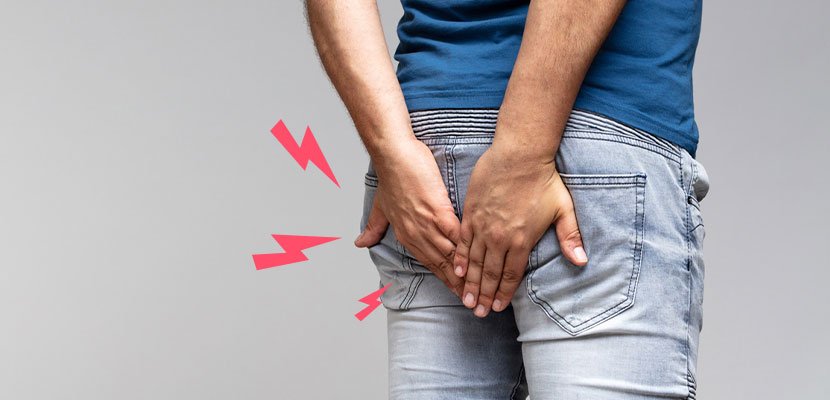
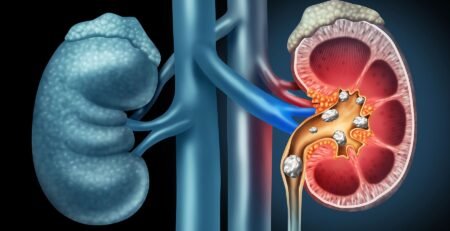
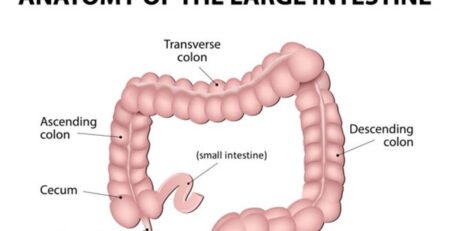
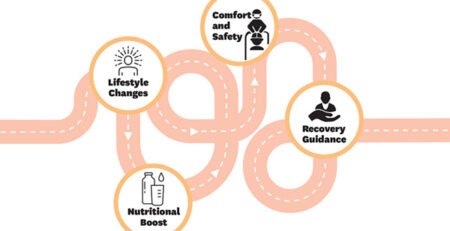
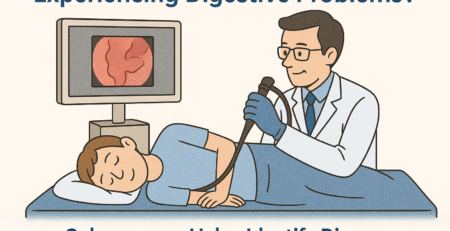
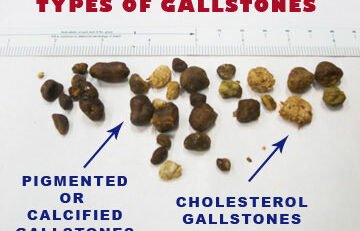
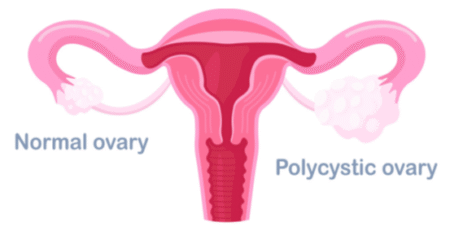
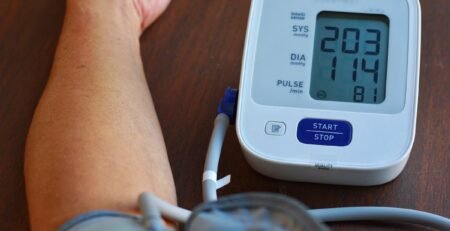
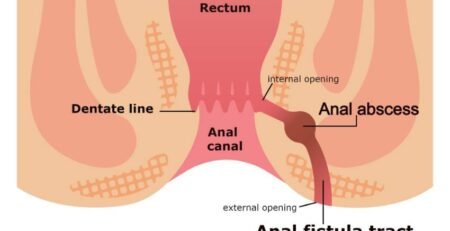
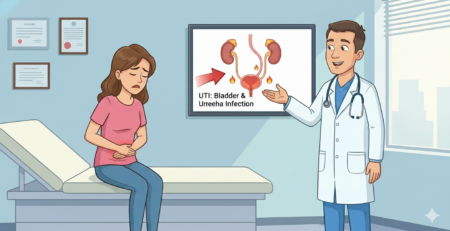
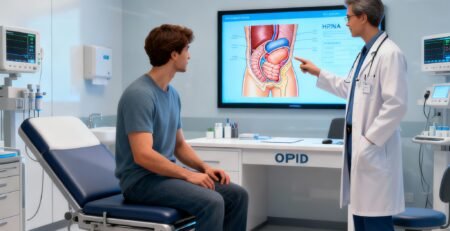
Leave a Reply